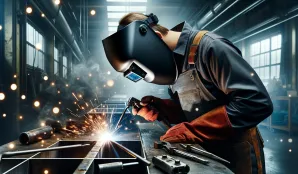News and articles
- Home
- Articles
Latest posts

A Street Musician entertains the public by performing music in public spaces, such as streets, squares, subways, and parks. Tasks vary from playing instruments and singing to organizing own concerts in public areas. The profession requires great musical skill, the ability to read the audience, and adapt performances to the surrounding atmosphere. The work environment is dynamic but also challenging, as work takes place outdoors in varying weather conditions and often without fixed income or employment conditions. Street Musicians contribute to the city's cultural life and create encounters between people in public spaces.
Read more ->
A Gatumaskinförare primarily works with operating and managing heavy machinery on roads, streets, and other construction sites. Tasks include everything from driving excavators and wheel loaders to performing basic service and maintenance of the machines. The work day is often characterized by outdoor work in varying weather conditions and takes place both in urban environments and rural areas. Safety and precision are crucial, as the operator often works near other vehicles, crews, and traffic. Collaboration with other construction professionals is a natural part of the job.
Read more ->-

Opinion Polls: Kantar-Sifo shows increased support for S, decline for SD and C
Fri, 13 Feb 2026 - 01:35 -

Policy rate remains at 1.75% – Riksbank signals stability
Thu, 29 Jan 2026 - 14:02

A street food assistant primarily works with preparing and serving simple dishes such as hot dogs, hamburgers, fries, and other fast food in street food stalls and small eateries. Tasks include food preparation, cash handling, dishwashing, cleaning, and customer service. The work environment is often fast-paced, as customers expect quick and efficient service, especially during lunch and dinner rushes. The job can be physically demanding with long periods of standing and working in environments with high noise levels and varying temperatures.
Read more ->
A Gatuingenjör is responsible for planning, design, construction, and maintenance of streets, roads, and related infrastructure in both urban and rural areas. Tasks often include project coordination, contact with contractors and authorities, as well as technical calculations and drawings. The role also involves quality control, environmental assessments, and safety analyses to ensure all work complies with current standards and laws. The work environment varies between outdoor field inspections and follow-ups, and office tasks such as planning and documentation.
Read more ->
A gastroenterologist is a specialist doctor who diagnoses and treats diseases of the stomach and intestines, liver, bile ducts, and pancreas. Typical tasks include patient assessments, endoscopic examinations, treatment of inflammatory bowel diseases, liver issues, and other gastrointestinal conditions. The work often takes place at hospitals, specialist clinics, or university hospitals, where close collaboration with other specialists and healthcare staff is standard. The work environment is characterized by a fast pace, varied tasks, and demands on both technical skills and good communication with patients.
Read more ->
A Guest Harbour Dues Collector is responsible for administering and collecting fees at guest harbors, primarily during the boating season. Tasks include receiving visiting boats, handling payments, registering arrivals and departures, and providing customer service to visitors. The role often involves outdoor work in harbor environments with varying weather conditions and requires good skills in managing digital systems and direct customer contact. The work environment is characterized by seasonal fluctuations, high activity during summer months, and periods of physical labor.
Read more ->
A Gassvetsare works with joining or cutting metals using gas flames, often acetylene and oxygen. Tasks include preparing materials, setting up equipment, and carefully performing welding and cutting on pipes, sheets, and components in industries, construction, and repair. The work requires high precision, safety awareness, and is often followed by quality checks. The work environment varies between workshops, industrial plants, construction sites, and sometimes outdoors, where noise, high temperatures, and gas exposure may occur. Protective gear and strict routines are therefore a natural part of the profession.
Read more ->
A Gas Filler works with refilling gases into various types of containers, such as industrial gas cylinders, medical gas bottles, or smaller packages for households and businesses. Tasks include manual handling and operation of automated filling stations, where safety and accuracy are critical. A typical workday may also include inspecting equipment, monitoring filling processes, and labeling and documenting filled containers. The work environment is often industrial, with a focus on safety routines and protective gear to minimize risks when handling pressurized and sometimes hazardous substances.
Read more ->
A gas cutter primarily works with cutting, shaping, and processing metals using gas-powered tools and welding equipment. Tasks include using gas torches to separate or cut metal structures, often according to drawings and precise measurements. Gas cutting is used in industries such as construction, shipyards, workshops, and demolition work. The work environment is often industrial, involving high noise levels, varying temperatures, and sometimes working at heights or in confined spaces. Safety and precision are central aspects of the job, as handling gas and hot materials requires great caution and protective gear.
Read more ->
A Gashyvlare mainly works with processing and cutting metal using gas-powered cutting tools in the industry. The profession requires precision and good technical understanding, as it often involves cutting, shaping, and joining materials according to drawings and specifications. Tasks can vary depending on the industry and project but typically include handling advanced equipment, safety inspections, and quality control of finished products. The work environment is often industrial, meaning work takes place in workshops, factories, or larger construction sites where heavy lifting and protective gear are a natural part of daily life.
Read more ->





